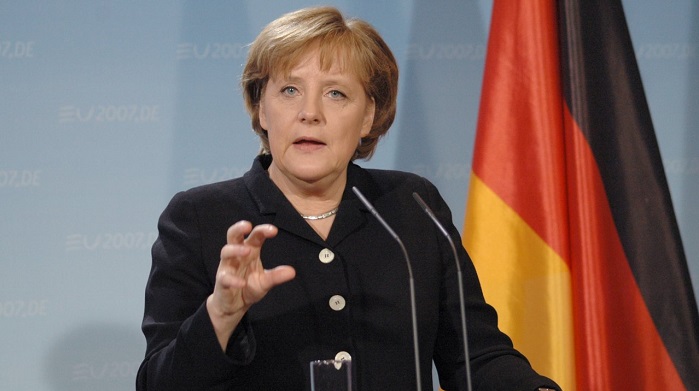Germany’s first female leader was in the well-to-do health resort town to campaign for her ruling Christian Democrats. The party faces a crucial test in just over a week’s time in three state elections which may well determine how long Ms Merkel can survive in power.
All three polls in the western states of Baden Württemberg, Rhineland Palatinate and eastern Saxony Ahhalt have, for weeks, been dominated by Ms Merkel’s eternally controversial “open door” refugee policy which allowed more than a million migrants to enter Germany last year and shows little sign of slowing.
Despite the continuing respect Ms Merkel receives as a proven “world leader” and her “We can do it” mantra concerning the refugee crisis, voters including many in her own party seem poised to punish her for apparently thinking too much about the world and not enough about Germany.
The elections are certain to benefit the recently formed, xenophobic and populist Alternative for Germany (AfD) party. which is on course to secure the biggest political gains by a far-right organisation since 1945. It recently advocated shooting illegal refugees at Germany’s borders and could win up to 20 per cent of the vote in the east.
Current opinion polls show that more than 80 per cent of Germans think Ms Merkel’s government has “lost control” of the refugee crisis. And, as neighbouring Austria and the Balkan countries close their borders to refugees, there is a growing chorus of German conservatives who want to do the same. Yet Ms Merkel went on national television last week to insist that she was not for turning.
Anti-Merkel sentiment was palpable in Bad Kreuznach as soon as the Chancellor broached the subject of refugees. “We want to tangibly reduce the numbers entering. The question is, how are we going to do this on a sustainable basis?” she asked her supporters. “We have to deal with the cause of what makes refugees flee!” was her answer, to feeble applause.
Ms Merkel set out how her government hopes to use Monday’s EU-Turkey summit to enlist Ankara’s help to hold back the refugee tide in return for billions in EU cash. But for many of her supporters, that would be too little too late. “Merkel has gone too far with the refugees, she has bitten off more than we can chew and frankly I fear for Germany’s future,” said Bernd Kassmann, a retired shop owner in his 70s. “I’m not voting for her again. I may even vote for the AfD. At least they have a clear view on the refugee problem.
The Christian Democrats are said to be losing up to 3,200 members a month because of dissatisfaction over the refugee issue. Dozens of local party officials, whose towns and villages have had to cope with a large migrant influx, have deluged Ms Merkel with protest letters.
In the Rhineland Palatinate and Baden-Wurttemberg, the party’s state branches were reportedly reluctant for Ms Merkel to campaign because her stance might deter voters. At several rallies, angry opponents have chanted “Merkel must go”. In eastern Germany, where the xenophobic AfD is strongest, she has only one appearance booked.
More embarrassing was Ms Merkel’s encounter with Julia Klöckner, her party’s leader in Rhineland Pfalz - a protégé of the Chancellor who has been tipped as a possible Merkel successor. Only 10 days ago she directly challenged Ms Merkel by insisting that German border closures should not be ruled out. This week, with Ms Merkel standing beside her, she carefully avoided the issue.
One key to Ms Merkel’s future is held by her staunch critic, Horst Seehofer, who is both Prime Minister of Bavaria and head of the state’s conservative Christian Social Union party, a key member of Germany’s ruling coalition in Berlin. Mr Seehofer sees conservative support evaporating and wants Germany to close its border if necessary.
If Ms Merkel fails to secure a refugee deal with Turkey on Monday, and severe conservative losses follow next weekend, Mr Seehofer may carry out his threat to take the government to the country’s constitutional court for failing to protect national borders. Such a move might torpedo Germany’s coalition government and topple Ms Merkel as Chancellor with it.
More about:
















































